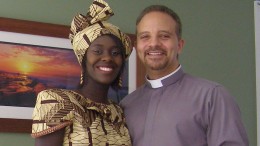A Christian fellowship will soon start in Canberra, created with the diplomatic corps in mind. The diplomatic community currently meets socially and for sports like golf and netball. “But when I first got here I didn’t hear of a group getting together for a religious purpose,” says Jacqueline Zwambila, Zimbabwean Ambassador to Australia.
“When I arrived in Canberra, I had no family with me. I felt it would be good to have some Christian fellowship. I wondered if other diplomats felt the same, asked around, and held a fellowship at the Residence. The then Finnish ambassador and her husband attended, along with ten others from the diplomatic and Zimbabwean communities.”
Asked why church alone didn’t fill her need for fellowship, she cites a shared understanding among those living far from home. “It’s nice to have fellowship with others in the diplomatic corps, others who are also thinking about spiritual things.”
The Ambassador is pleased that there are plans afoot for a regular group. Called the International Fellowship, it’s aimed at ministering to the heads of missions, staff and their families. It’s the brainchild of Paul Wallis, Archdeacon for North Canberra, and Stuart Robinson, Bishop of Canberra and Goulburn. Both men had had similar visions about the ministry. “It so excited us, we knew it was something we needed to make happen.”
Wallis is of English, Welsh and Ghanaian heritage. He was trained in the UK and Brazil and ordained in London. Over the years he’s helped plant eight churches, two of them ethnically-based. His experience with diversity has earmarked him for the role as chaplain to the International Fellowship.
“ I’ve always found it easy to connect with people from other countries. Canberra is obviously very international, and since moving back here in 2011 I’ve had this international aspect on my heart. There is a new demographic here that is untouched and unreached, and I really want to be involved with them.”
Wallis says the fellowship welcomes “people of any or no faith” but there will be a focus on the diplomatic corps. “Being away from home is hard for them and even harder for their families; they feel very isolated. I know of one embassy staff member who lost a father, and another who lost a son, during their posting here. Having the fellowship creates an arena for friendships. I’d like the diplomatic community to be happy in Canberra, and I want to provide easy access to pastoral care and Christian fellowship.
“The fellowship will take (the Anglican) Fresh Expressions approach; that’s where you don’t start by asking people to church, you start by finding community together. The aspect of discipleship is adjacent to that,” he explains.
“We’ll invite people to gather around music, food, art, culture and excursions around Canberra. People will come because they’ll find others who speak their own language, and an overwhelming welcome.”
Wallis agrees that the success of the fellowship will involve buy-in from the diplomatic corps itself. “A number of heads of embassies and high commissions are interested. They know that some of their staff come from faith backgrounds – Catholic, Lutheran and Anglican – and they are supportive of the fellowship.”
Ambassador Zwambila certainly counts as one. “I think the International Fellowship is a very good idea,” she says.
The launch is scheduled for just after Easter, and then begins the immediate task of getting financial partners. Wallis is looking forward to the new challenge of getting the fellowship up and running. “The uncertainty of this is part of the excitement! It forces us to be dependent on the Lord, and to seek him for each step.”
The International Fellowship will meet in different places, but will be centred in Yarramlumla, Canberra’s hub of embassies and high commissions.
Email This Story
Why not send this to a friend?

